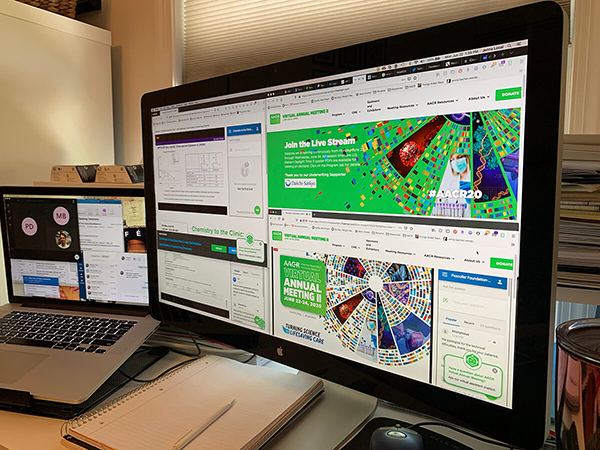AACR Annual Meeting 2021: A User’s Guide
For the second consecutive year, this year’s AACR Annual Meeting will take place in a virtual format. While we miss the thrill of the in-person meetings, we are excited to once again deliver a full program featuring the latest in basic, translational, and clinical research.
Just one year ago, as the coronavirus pandemic swept the globe, the AACR moved swiftly to conduct the Annual Meeting 2020 in an all-virtual format. Through the leadership of 2019–2020 President Elaine R. Mardis, PhD, FAACR, and Program Committee Chair Antoni Ribas, MD, PhD, FAACR, we were able to present two virtual Annual Meetings in April and June. In all, more than 80,000 members of the cancer research community joined us to explore and advance the frontiers of scientific innovation.

The virtual Annual Meeting 2021, led by AACR President Ribas and this year’s Program Committee Chair, Charles Swanton, MBPhD, FAACR, features the theme Discovery Science Driving Clinical Breakthroughs. Week 1, set for April 10-15, will feature the opening ceremony, plenary sessions, major scientific sessions, select science policy sessions, forums, and award lectures. All proffered abstracts that are accepted for presentation—including clinical trials and late-breaking abstracts—will be presented in plenary sessions, minisymposia, and ePoster sessions during this week.
Week 2, scheduled for May 17-21, will feature education sessions, methods workshops, meet the expert sessions, regulatory science and science policy sessions, additional award lectures, town halls, other special sessions, and professional advancement sessions.
As we wrap up preparations for the AACR Annual Meeting 2021, here are a few tips to help you make the most of the meeting.
Science on demand
It’s a common dilemma at the Annual Meeting: With so many intriguing sessions in the program, which do you choose? Can you possibly run from one side of the convention center to the other in time to catch everything you want to see?
The virtual format provides a convenient solution to this issue. This year, more than 70 scientific sessions are available for “On Demand” viewing, beginning Friday, April 9. Standard registration includes access to the On Demand sessions, which will include Major Symposia; Advances in Diagnostics and Therapeutics; Advances in Organ Site Research; Advances in Prevention‚ Early Detection‚ and Interception; Advances in Science of Cancer Health Disparities; several Special Sessions, and scientific achievement award lectures. For a complete listing of On Demand sessions, please visit the online planner located on the virtual Annual Meeting website.
As a complement to the On Demand sessions, each session will be paired with a 30-minute live panel discussion held during the April 10-15 meeting. This is a great opportunity to watch sessions at your convenience, then devote the live meeting time to follow-up viewing and discussion. You can submit questions to presenters in advance or during the live panels via a chat function. Once the Annual Meeting concludes, all sessions and live discussions will be available to registrants for on-demand viewing through June 21, 2021.
A few technical notes
To make the most of the Annual Meeting, take a moment now to make sure your devices meet our technology requirements.
The video player is embedded into the virtual Annual Meeting platform, so you do not need to install any software or adjust any computer settings. You will be able to view the meeting content as long as you use a supported browser; here’s how you can check your browser. Chrome, version 89, and Firefox, version 86, are preferred. Please note that Internet Explorer is not supported by the virtual AACR Annual Meeting platform and should not be used to access the meeting.
Connecting with colleagues
One challenge of a virtual meeting is recreating the experience of interacting with speakers, colleagues, and exhibitors. It’s hard to replicate the serendipity of meeting a long-admired researcher in an elevator or connecting with a former colleague over coffee.
However, we’ve come up with a new way to make connections. This year, our virtual meeting platform will include a Networking module where attendees can look up presenters, other attendees, and exhibitors and send them chat messages or requests for meetings. The platform supports group discussions of up to 50 participants, and the virtual meeting rooms will include video conference and screen sharing functionality, so that attendees can discuss their latest research.
E-poster viewers will also be able to use the Networking module to interact with poster presenters. In addition, the e-poster site will include an “E-mail Presenter” link so that attendees can send comments and initiate discussions.
Annual Meeting news
This year, TriStar Event Media will provide a daily report on the AACR Annual Meeting, called AACR News. Registered attendees will receive a digital copy of the publication each day of the meeting, as well as several pre- and post-meeting editions, including the premiere edition, published last week. In addition to AACR News, the Cancer Research Catalyst blog and Cancer Today, the AACR’s magazine for cancer patients, survivors, and their family and friends, will provide extensive coverage of the meeting.
As always, social media will be a dynamic means of sharing information and connecting with colleagues around the world. We encourage the use of social media as a way to forge connections and keep track of the latest developments. However, we also want to protect some researchers’ wishes of not having their preliminary and unpublished data shared openly on social channels or other publications. If you see a note on a presentation saying, “DO NOT POST,” you must respect the presenters’ request and refrain from posting any images from these designated slides or posters on social media.
If you’re following the Annual Meeting on Twitter, please use the hashtag #AACR21. Follow us on Facebook and LinkedIn for further information and engagement.



